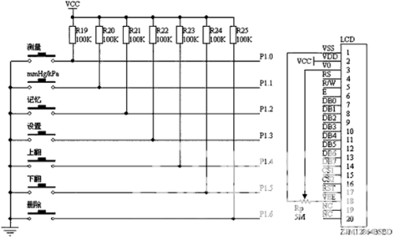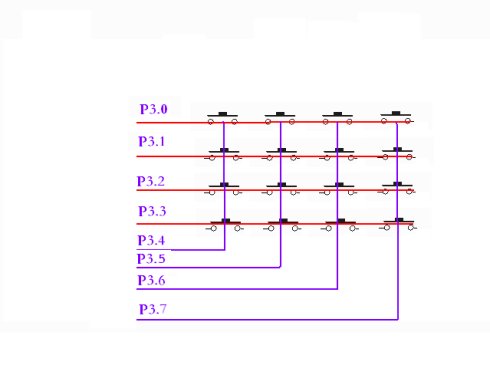在前面我们讲的都是向单片机中向外输出数据,今天我们开始介绍一下如何向单片机里面输入数据,也就是键盘。
键盘有两种,独立式键盘与行列式矩阵键盘。
独立式键盘是指直接用一根I/O口线构成的单个按键电路,每个I/O口的按键不会影响另外一个,具体电路图如下:

接下来看一个程序,这个程序主要是按键二极管亮,同时按一下数码管显示一下,往下加,加到9,具体程序如下:
#include
#defineuintunsignedint;
#defineucharunsignedchar;
sbitd1=P1^2;
sbitduan=P2^2;
sbitwei=P2^3;
sbitkey1=P3^3;
ucharcodetable[]={
0x3f,0x06,0x5b,0x4f,
0x66,0x6d,0x7d,0x07,
0x7f,0x6f,0x77,0x7c,
0x39,0x5e,0x79,0x71};
ucharnum,t1,y,z;
voiddelay(uintz)
{
uintt1,y;
for(t1=z;t1>0;t1--)
for(y=110;y>0;y--);
}
voidmain()
{wei=1;
P0=0xfe;
wei=0;
key1=1;
while(1)
{
if(key1==0)
{
delay(10);
if(key1==0)
{
d1=0;
num ;
if(num==10)
num=0;
}
while(key1==0);//这个语句加的好神奇
}
else
d1=1;
duan=1;
P0=table[num];
duan=0;
}
}
但是在仿真时就出现问题了,C(15):errorC141:syntaxerrornear;对应的是这句voiddelay(uintz),但直到现在我都不知道它到底哪里错了,真悲哀,先记下来,以后有时间回过头再看。
矩阵式键盘跟独立式键盘相反,彼此之间是有联系的,如下图:

矩阵式键盘的原理也很简单,跟独立按键的基本原理是一样的,但是它是一行一行扫描的,由于时间关系就不做过多分析,具体看一下下面的编程:
#include
#define uint unsigned int
#define uchar unsigned char
sbit dula=P2^6;
sbit wela=P2^7;
sbit key1=P3^4;
uchar code table[]={
0x3f,0x06,0x5b,0x4f,
0x66,0x6d,0x7d,0x07,
0x7f,0x6f,0x77,0x7c,
0x39,0x5e,0x79,0x71,0};
uchar num,temp,num1;
void delay(uint z)
{
uint x,y;
for(x=z;x>0;x--)
for(y=110;y>0;y--);
}
uchar keyscan();
void display(uchar aa);
void main()
{
num=17;
dula=1;
P0=0;
dula=0;
wela=1;
P0=0xc0;
wela=0;
while(1)
{
display(keyscan());
}
}
void display(uchar aa)
{
dula=1;
P0=table[aa-1];
dula=0;
}
uchar keyscan()
{
P3=0xfe;
temp=P3;
temp=temp&0xf0;
while(temp!=0xf0)
{
delay(5);
temp=P3;
temp=temp&0xf0;
while(temp!=0xf0)
{
temp=P3;
switch(temp)
{
case 0xee:num=1;
break;
case 0xde:num=2;
break;
case 0xbe:num=3;
break;
case 0x7e:num=4;
break;
}
while(temp!=0xf0)
{
temp=P3;
temp=temp&0xf0;
}
}
}
P3=0xfd;
temp=P3;
temp=temp&0xf0;
while(temp!=0xf0)
{
delay(5);
temp=P3;
temp=temp&0xf0;
while(temp!=0xf0)
{
temp=P3;
switch(temp)
{
case 0xed:num=5;
break;
case 0xdd:num=6;
break;
case 0xbd:num=7;
break;
case 0x7d:num=8;
break;
}
while(temp!=0xf0)
{
temp=P3;
temp=temp&0xf0;
}
}
}
P3=0xfb;
temp=P3;
temp=temp&0xf0;
while(temp!=0xf0)
{
delay(5);
temp=P3;
temp=temp&0xf0;
while(temp!=0xf0)
{
temp=P3;
switch(temp)
{
case 0xeb:num=9;
break;
case 0xdb:num=10;
break;
case 0xbb:num=11;
break;
case 0x7b:num=12;
break;
}
while(temp!=0xf0)
{
temp=P3;
temp=temp&0xf0;
}
}
}
P3=0xf7;
temp=P3;
temp=temp&0xf0;
while(temp!=0xf0)
{
delay(5);
temp=P3;
temp=temp&0xf0;
while(temp!=0xf0)
{
temp=P3;
switch(temp)
{
case 0xe7:num=13;
break;
case 0xd7:num=14;
break;
case 0xb7:num=15;
break;
case 0x77:num=16;
break;
}
while(temp!=0xf0)
{
temp=P3;
temp=temp&0xf0;
}
}
}
return num;
}


